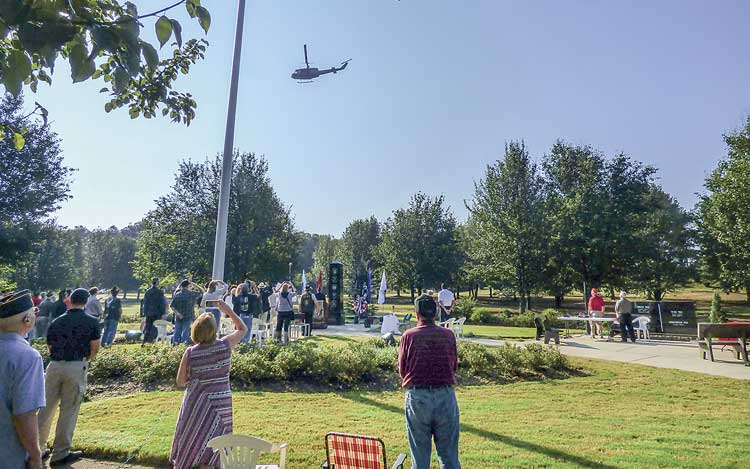Patriot Park in Fayetteville was the setting for the POW/MIA Recognition Day ceremony held Sept. 15. It was a time to remember those who never returned to their families, friends and homes.
The occasion marked the first time the annual observance was held at Patriot Park, and was sponsored by local veterans’ groups and attended by a large group from across Fayette and Coweta counties.
Above, members of the Fayetteville American Legion post salute the flag during the ceremony. Photo/Ben Nelms.
“Sacrifice is meaningless without remembrance,” said American Legion Post 50 representative Arnie Geiger, who served as master of ceremonies.
Speakers at the event gave the histories of POW/MIA Recognition Day and the POW/MIA flag. Still other speakers recalled the lives of those they knew gave the last full measure of devotion.
Events honoring members of the military are not uncommon in America. This event, often less well-attended than many others, nonetheless holds a different kind of significance. It is one born of the emptiness experienced by the comrades and families of the missing whose fate remains unknown.
As is customary at the yearly remembrance, the Missing Man Table, also known as the Fallen Comrade Table, was in place during the ceremony. The significance and symbolism of the table and its items was provided by David Niebes (American Legion Post 105).
For those unaware of its significance, the empty table might bear little notice. But for those who understand, that table and its contents and the chair beside it means everything.
The small table is round to show everlasting concern for America’s missing men.
The tablecloth is white, symbolizing the purity of the motive when answering the call to duty.
The single red rose in a vase is a reminder of the life of each one missing, and their loved ones and friends who keep the faith, awaiting answers.
The vase tied with a red ribbon is a symbol of the continued determination to account for those missing.
The slice of lemon on the bread plate is a reminder of the bitter fate of those captured and missing in foreign lands.
A pinch of salt symbolizes the tears endured by those missing and their families who seek answers.
The Bible represents the strength gained through faith to sustain those lost from this country, founded as one nation under God.
The glass is inverted to symbolize their inability to share a daily toast.
The chair is empty; they are missing.
The only thing left to say is that the whereabouts of those still unaccounted for deserve to be known. They displayed the love for their country by serving and they deserve to have their nation display a similar love for them.
The solemn ceremony concluded with the playing of “Taps” and a chopper flyover provided by the Army Aviation Heritage Foundation.







